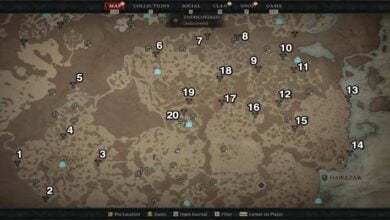Being an Unconventional Rule Breaker: Embracing Oathbreaking in Baldur’s Gate 3
I have always been the type of player who aims to please everyone in RPGs. Regardless of how many times I embark on new playthroughs, I find myself compelled to portray a virtuous character that even the most challenging party members can trust. It’s no surprise, then, that in Baldur’s Gate 3, I chose to play as a Paladin, bound by my moral code and oath (specifically, the Oath of Vengeance, which adds a touch of intriguing complexity). Just like a tabletop Dungeon Master, Baldur’s Gate 3 demands that your Paladin fully embrace their role. Failure to do so will result in being forced to abandon your chosen subclass and instead become an Oathbreaker.
The Oathbreaking Paladins, one of the most peculiar subclasses in Baldur’s Gate 3, immediately grabbed the attention of our resident Dungeons & Dragons enthusiasts. And now, having experienced it firsthand, I can confirm that embracing your dark side is strangely captivating.
How Does Oathbreaking Actually Happen?

There are several paths to becoming an Oathbreaker in Baldur’s Gate 3; some involve significant story choices, while others catch you off guard. Personally, I knowingly broke my oath by making a deliberate decision to revert to a previous save state and agreeing to raid the Emerald Grove. This decision was motivated solely by my desire to spend a night with the alluring yet sinister Drow lady. As someone who had pledged to show no mercy to the wicked and always fight against the greater evil, siding with the goblins was an unmistakable violation of my oath.
On the other hand, my fellow PC Gamer Paladin, Tyler Wilde, accidentally broke his vow of Devotion (characterized by courage, compassion, and duty) while attempting to rescue Lae’zel from the tieflings who had captured her early in the game. He masqueraded as their ally in order to set her free, only to end up killing them—an act that befitted neither honor nor integrity. Interestingly, Tyler wasn’t the only PC Gamer editor who fell victim to this encounter, so beware the inflexible nature of the Devotion oath. Following my unforgivable transgression, the Ghost of Paladin’s Past (also known as the Oathbreaker Knight) paid me a visit, bestowing upon me an ominous vision and placing me in temporary suspension from using my oath actions. Later, at my camp, the knight confronted me and delivered a speech that evoked more disappointment than anger—a classic “I’m not mad, just disappointed” scenario. I was given the opportunity to explain myself, justifying my actions with a range of arguments, from “following my oath was unconscionable” to “it was unintentional” to “I grew tired of dogma.” Surprisingly, Karlach, one of my righteous party members, seemed to find the latter justification acceptable, suggesting that even the most virtuous companions can perceive shades of gray in certain situations. As for the knight himself, he claimed to have his own noble reasons for renouncing his oath.
What Does Being an Oathbreaker Entail?

Having fallen from grace, I was forced to accept the consequences: forfeiting my debuffing skills for villains—such as Vow of Enmity, Bane, and Abjure Enemy—in favor of more sinister alternatives like Dreadful Aspect and Control Undead.
At level 5, here is what my Oathbreaker gained:
- Spiteful Suffering (Oath Charge Action): Inflicts 1d4 Necrotic damage on the target for 3 turns, granting advantage on all attack rolls against it.
- Control Undead (Oath Charge Action): Exerts control over an undead creature, compelling it to follow and attack your enemies until the next long rest.
- Dreadful Aspect (Oath Charge Action): Instills fear in a nearby enemy for 2 turns.
- Hellish Rebuke (Evocation Spell): A reaction that inflicts 2d10 fire damage in response to an attack.
- Inflict Wounds (Necromancy Spell): Deals 3d10 necrotic damage at melee range.
Breaking my oath necessitated a change in playstyle to adapt to these new abilities. Additionally, I had to reconsider who I ventured with regularly. As an Oathbreaker Paladin, I now charge into the front lines of battle much more swiftly, discarding my previous strategy of buffing allies before engaging enemies. Rather than trying to replace Shadowheart’s melee combat and healing skills, I found myself more aligned with Wyll’s blend of melee combat and offensive spellcasting.
If, by any chance, you wish to avoid becoming a necrotic, vengeful shadow of your former self, you have the option to redeem yourself through an offering of 1,000 gold to the Oathbreaker Knight at your camp, thus allowing you to reaffirm your commitment to your beliefs.
So far, breaking my oath has opened up a plethora of roleplaying possibilities. I still retain access to all Paladin-specific dialogue choices, which involve mediating conflicts and offering guidance to other characters. Although I haven’t encountered any dialogue specifically tailored to Oathbreakers, I can’t help but imagine that such interactions exist.
With the shackles of my oath now removed, I can craft various headcanons for my Paladin’s story. Perhaps I’ve genuinely grown weary of blind adherence to doctrine and will henceforth avoid aligning with any particular class dialogue choices, imposing my ever-changing will upon my party. Or maybe I’m consumed by regret, fighting for the greater good while waiting until the climax of my journey to reclaim my oath. After experiencing the thrill of playing a treacherous wanderer, I’m beginning to entertain the idea of permanently embracing the path of the Oathbreaker.
(Images credit: Larian Studios)


